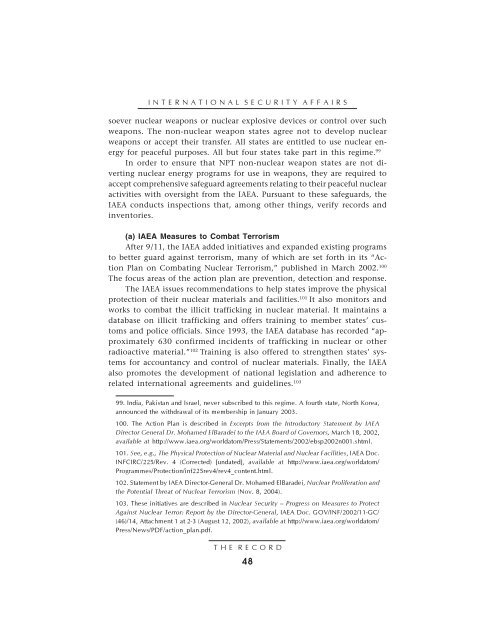2007 Issue 1 - New York City Bar Association
2007 Issue 1 - New York City Bar Association
2007 Issue 1 - New York City Bar Association
You also want an ePaper? Increase the reach of your titles
YUMPU automatically turns print PDFs into web optimized ePapers that Google loves.
I N T E R N A T I O N A L S E C U R I T Y A F F A I R S<br />
soever nuclear weapons or nuclear explosive devices or control over such<br />
weapons. The non-nuclear weapon states agree not to develop nuclear<br />
weapons or accept their transfer. All states are entitled to use nuclear energy<br />
for peaceful purposes. All but four states take part in this regime. 99<br />
In order to ensure that NPT non-nuclear weapon states are not diverting<br />
nuclear energy programs for use in weapons, they are required to<br />
accept comprehensive safeguard agreements relating to their peaceful nuclear<br />
activities with oversight from the IAEA. Pursuant to these safeguards, the<br />
IAEA conducts inspections that, among other things, verify records and<br />
inventories.<br />
(a) IAEA Measures to Combat Terrorism<br />
After 9/11, the IAEA added initiatives and expanded existing programs<br />
to better guard against terrorism, many of which are set forth in its “Action<br />
Plan on Combating Nuclear Terrorism,” published in March 2002. 100<br />
The focus areas of the action plan are prevention, detection and response.<br />
The IAEA issues recommendations to help states improve the physical<br />
protection of their nuclear materials and facilities. 101 It also monitors and<br />
works to combat the illicit trafficking in nuclear material. It maintains a<br />
database on illicit trafficking and offers training to member states’ customs<br />
and police officials. Since 1993, the IAEA database has recorded “approximately<br />
630 confirmed incidents of trafficking in nuclear or other<br />
radioactive material.” 102 Training is also offered to strengthen states’ systems<br />
for accountancy and control of nuclear materials. Finally, the IAEA<br />
also promotes the development of national legislation and adherence to<br />
related international agreements and guidelines. 103<br />
99. India, Pakistan and Israel, never subscribed to this regime. A fourth state, North Korea,<br />
announced the withdrawal of its membership in January 2003.<br />
100. The Action Plan is described in Excerpts from the Introductory Statement by IAEA<br />
Director General Dr. Mohamed El<strong>Bar</strong>adei to the IAEA Board of Governors, March 18, 2002,<br />
available at http://www.iaea.org/worldatom/Press/Statements/2002/ebsp2002n001.shtml.<br />
101. See, e.g., The Physical Protection of Nuclear Material and Nuclear Facilities, IAEA Doc.<br />
INFCIRC/225/Rev. 4 (Corrected) [undated], available at http://www.iaea.org/worldatom/<br />
Programmes/Protection/inf225rev4/rev4_content.html.<br />
102. Statement by IAEA Director-General Dr. Mohamed El<strong>Bar</strong>adei, Nuclear Proliferation and<br />
the Potential Threat of Nuclear Terrorism (Nov. 8, 2004).<br />
103. These initiatives are described in Nuclear Security – Progress on Measures to Protect<br />
Against Nuclear Terror: Report by the Director-General, IAEA Doc. GOV/INF/2002/11-GC/<br />
(46)/14, Attachment 1 at 2-3 (August 12, 2002), available at http://www.iaea.org/worldatom/<br />
Press/<strong>New</strong>s/PDF/action_plan.pdf.<br />
T H E R E C O R D<br />
48

















